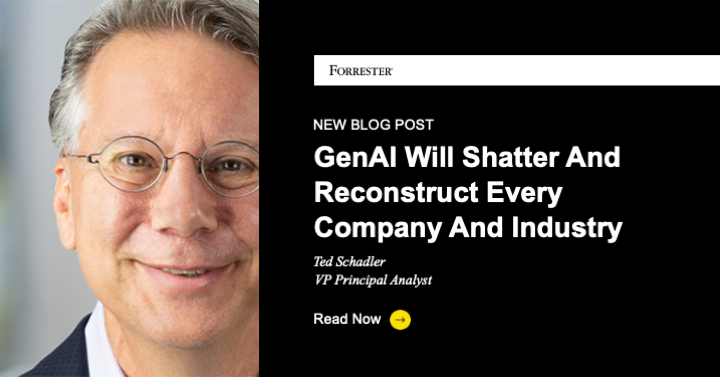Brian Hopkins, Julie Mohr, Julie Ask, and I are investigating how generative AI (genAI) will change the face of business and industry. We are doing research into the long view of what, why, and how genAI will break down and rebuild how businesses work; how consumers live; how knowledge and reality patterns shift; and how companies, industries, and economies will be forced into new shapes and structures.
When we look back in 25 years, where will the long-lasting economic value be created and captured? Which companies, which industries, and which countries will win? Which will lose?
Along with our rapidly expanding commitment to genAI research and guidance to help Forrester’s commercial, government, and technology clients, we will go after an era-defining question:
How will artificial intelligence shatter and reconstruct your company, industry, and country, and redefine the roles you and your company play in a genAI-native future?
We see these changes as inevitable but murky, just as the future was in the early days of the internet. We are not seeking to understand artificial general intelligence or examine existential threats. Rather, we assume that our ability to govern and keep AI safe will grow as AI grows. What will that future look like?
This post frames the research into what will happen as companies and institutions capture and put more and more knowledge (data and content, captured and tacit) to work using software, automation, and the power of AI. My colleague, Brian Hopkins, will be posting shortly about our early hypothesis about how this will happen. Also look for upcoming posts by Julie Mohr and Julie Ask.
The first productivity-centric wave of genAI impact on companies is coming into focus. By improving task productivity roughly 30% to 300%, over the next few years, genAI-powered applications will reshape every knowledge-fueled task and job and reconstruct knowledge practices and resources in every company in every industry.
KPMG, for example, just announced a 50% productivity gain in knowledge tasks when it gave 7,000 employees Microsoft Copilot, a set of productivity applications built on OpenAI’s large language model.
But what about genAI’s impact on revenue — generating new revenue streams, extensions, and channels? And what about reinvention? How will companies reinvent themselves using the power of genAI? Over the next 25 years, how will genAI force entire industries to restructure to take advantage of the value generated by machines? How will countries respond to set their economies and citizens up for success?
We invite your ideas and participation for this part of our research as we pursue these questions:
- How will organizations capture, automate, and amplify the value of their knowledge? What defines the natural boundaries of this? We are currently framing this in two dimensions: 1) captured knowledge and tacit knowledge; and 2) high expertise and high repeatability.
- How will firms deploy genAI capabilities to generate new revenue? What products, services, extensions, channels, and new firms will genAI disrupt and reinvent?
- How will genAI change the composition of jobs? How will employees acquire expertise and progress in their careers? What will be the new flow and staffing of a company’s information-driven processes and the structure of its value chains?
- How will industries be disrupted by new players or companies moving with more AI-native strategies? How will industries be reshaped by the shift in expertise and automation? How will some companies expand? How will some become more narrowly focused? What will the future value chains look like in industries like banking, healthcare, manufacturing, automotive, energy, transportation, media, and retail?
- What policies will governments adopt to create more advantage for their countries in a world where output, expertise, and revenue are defined by how firms activate their knowledge through genAI?
We are interested in your views. Please reach out to schedule some time with via our inquiry team by emailing inquiry@forrester.com.








